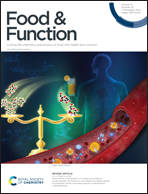Abstract
Prunes have health benefits, particularly in postmenopausal women. It is likely that the gut microbiome mediates some of these effects, but its exact role remains to be elucidated. This study aims to characterize the effect of prune supplementation on the gut microbiome of postmenopausal women. The fecal microbiome of 143 postmenopausal women ages 55–75 who met the compliance criteria in a randomized controlled trial of a 12-month dietary intervention in one of three treatment groups – no prunes (n = 52), 50 g prunes per day (n = 54), or 100 g prunes per day (n = 37) – was characterized at baseline and at the 12-month endpoint using 16S rRNA gene sequencing and QIIME2. Additional outcomes included assessment of select urinary phenolic metabolites and inflammatory markers. After 12 months, microbiomes of women consuming 50 g prunes had decreased evenness in bacteria taxa (Pielou's Evenness, Kruskal–Wallis p = 0.026). Beta diversity comparisons indicated significant differences in microbiomes among prune treatments (Bray–Curtis PERMANOVA, p = 0.005), and the effect was different at each prune dose (p = 0.057). Prunes enriched some bacterial taxa such as the family Lachnospiraceae (LEfSe LDA = 4.5). Some taxa correlated with urinary phenolic metabolites and inflammatory markers. Blautia negatively correlated with total urinary phenolics (r = −0.25, p = 0.035) and Lachnospiraceae UCG-001 negatively correlated with plasma concentrations of IL-1β (r = −0.29, p = 0.002). Differing gut microbiomes and correlation of some taxa with select phenolic metabolites and inflammatory markers, particularly Lachnospiraceae, after prune consumption suggest a potential mechanism mediating health effects. The microbiome differences at each dose may have implications for the use of prunes as a non-pharmacological whole food intervention for gut health.



 Please wait while we load your content...
Please wait while we load your content...